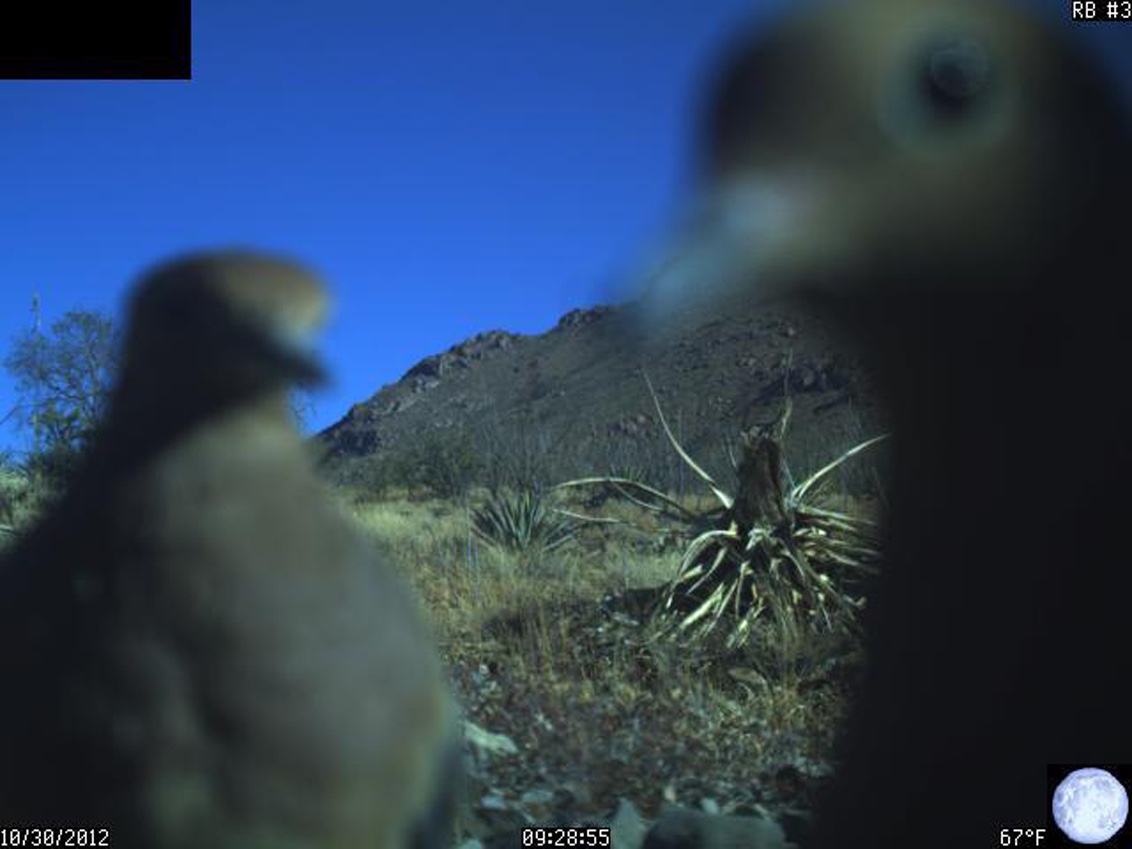
Joana Moll, AZ: move and get shot, 2012-2014
Joana Moll is a young artist and researcher whose work critically explores the way post-capitalist narratives affect the alphabetization of machines, humans and ecosystems. Her main research topics include Internet materiality, surveillance, online tracking, critical interfaces and language.
I first encountered Joana’s work a couple of years ago when i read about her online works such as Texas Border, AZ: Move and Get Shot and Virtual Watchers which look into the crowdsourcing of the surveillance of the US/Mexico border by civilians.
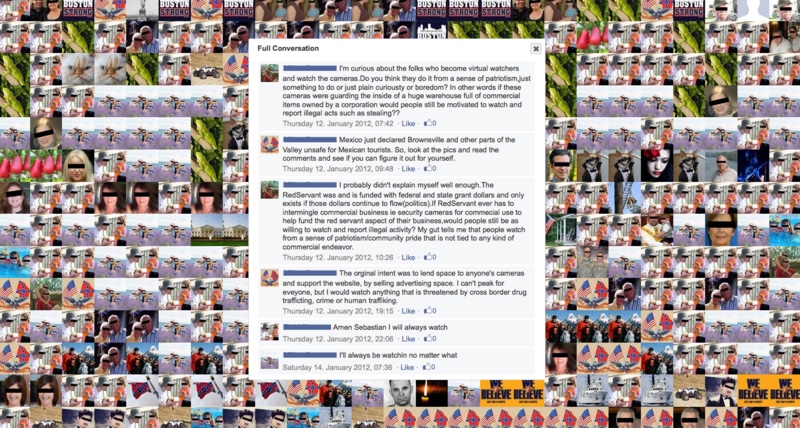
Joana Moll, in collaboration with anthropologist Cédric Parizot, The Virtual Watchers
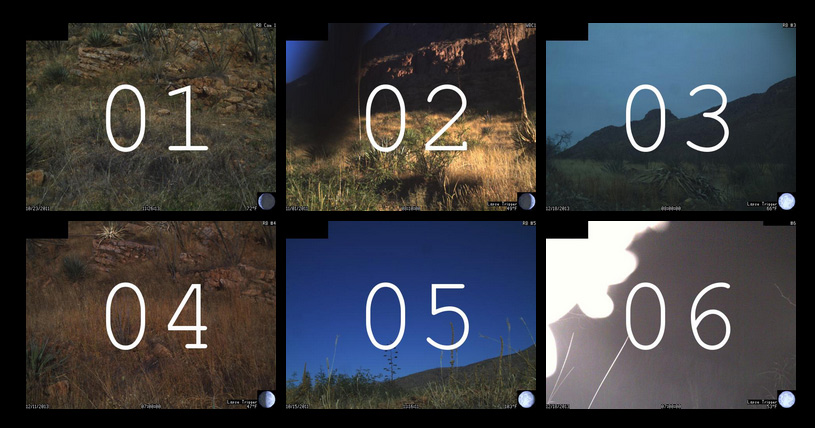
Joana Moll, AZ: move and get shot, 2012-2014
These projects expose two rising features of contemporary culture: the insidious militarization of civil society but also the dilution of individual responsibility enabled by technology. I would really recommend that you check out the talk Surveillance through social networks along the US-Mexico Border that she gave a couple of years ago at AntiAtlas of Borders conference because today’s interview is not going to focus specifically on these works.
The reason why i got in touch with Joana is that she is the co-founder of the Critical Interface Politics Research Group at HANGAR, a centre for arts production and research in Barcelona.
This ongoing research project investigates the complex physical structure of the Internet and in particular the many actors, (infra)structures, systems and materials that have a direct but often covert impact on every aspect of our daily lives: submarine and underground cables that perpetuate colonialist heritage, companies and countries that have access to our data, ecological costs of online habits, commodification of data, cultural biases within user interface design, etc.
Joana Moll not only probes into these questions in her own artistic works but she has also started to develop a series of workshops, strategies and tools that enable other people, no matter how tech savvy they are, to delve into these issues but also to subvert the material and computational architectures of the internet.
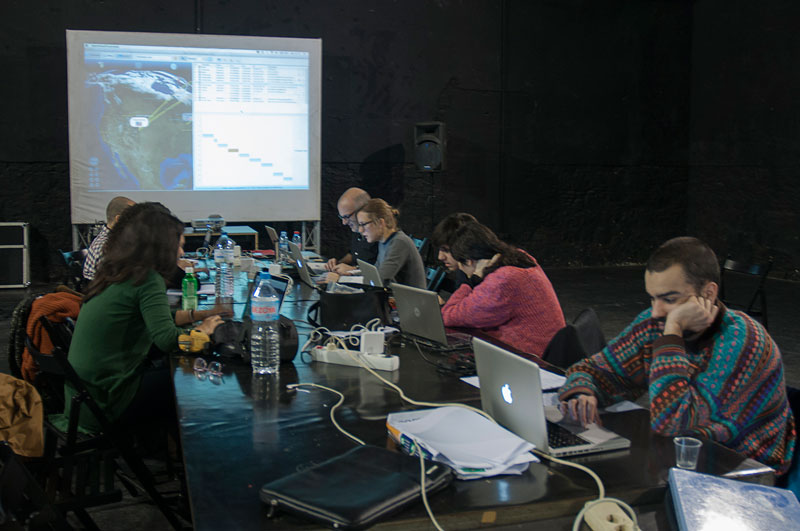
Poetic Destruction of the Interface, a workshop on Critical Interface Politics at HANGAR, Barcelona, 2016
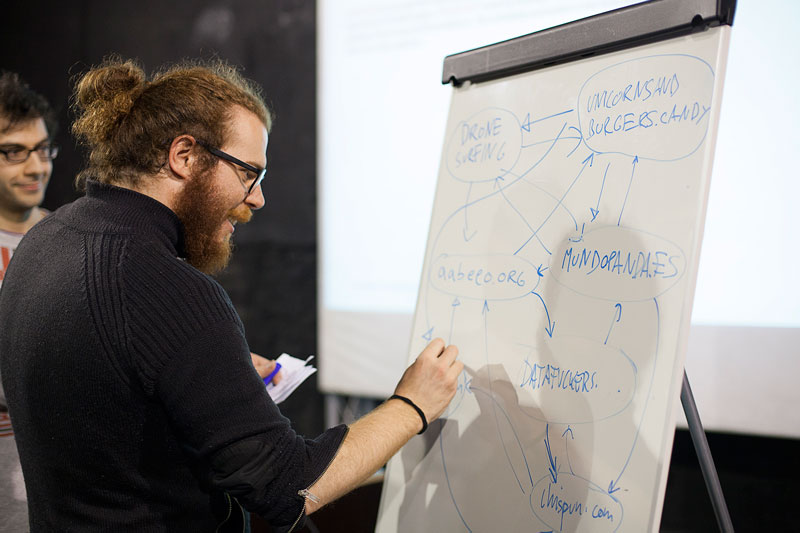
Performing PageRank physically, from Poetic Destruction of the Interface, a workshop on Critical Interface Politics at HANGAR, Barcelona, 2016
Joana will be giving online classes about the power of interfaces and the way we can learn to democratize them in May with the School of Machines, Making & Make-Believe. In the meantime, i had a skype chat with Joana. Here’s what it sounded like:
Hi Joana! The Tracking Forensics workshops, which you organised together with Andrea Noni and Vladan Joler, looked at the material impact of the so-called digital immateriality on the ecosystems. The word ‘forensics’ suggests the collection of criminal evidences. Why did you chose this title for the workshops?
Maybe i should start with the background of the workshop?
You know what? That’s a good idea!
Hangar in Barcelona was at the origin of this workshop. They invited me over a year ago to lead an investigation for IMAGIT, a European project that deals with criticism of interfaces. They asked me to develop some actions that would flesh out some of the more abstract concepts that they explored in the Manifesto for a critical approach to the user interface.
I ended up developing 3 workshops that lasted each for 12 hours. Over the course of these workshops, we explored topics such as the materiality of the internet, code, cognition, power and then interface, intervention governance, bias in the interfaces, etc. We were trying to cover everything that goes beyond the interface.
And then while working with another colleague at Hangar, we started to talk a lot about forensics, tracking forensics, online tracking and surveillance, I have been exploring these topics for many years. So we came up with this idea of doing the same workshops that we had done already but the difference would be that we’d focus much more on tracking.
We invited Vladan to give a talk in the workshop because he was already at Hangar doing a residency i had curated on the topic of tracking forensics and ethical uses of collected data.
The term “forensics” refers to cyber forensics (or computer forensics), the official term used when you follow the path of crime where evidence is stored digitally. You thus approach the online traces as if you were in front of a crime scene.
As for “tracking”, it refers to the action of monitoring people’s activity on the internet. Basically the workshop was about showing how you can understand the dynamics, the mechanisms that corporations, agencies and governments use to collect your data. Share Lab in Serbia did a massive research on that topic.
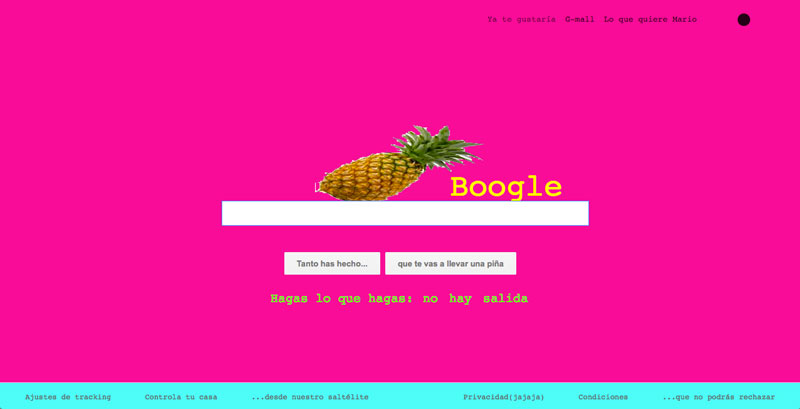
Interface Hack, from Poetic Destruction of the Interface, a workshop on Critical Interface Politics at HANGAR, Barcelona, 2016
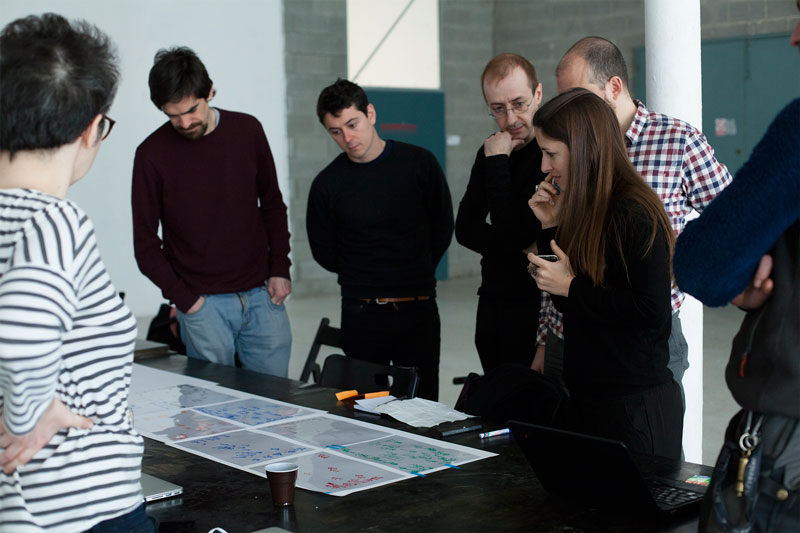
Poetic Destruction of the Interface, a workshop on Critical Interface Politics at HANGAR, Barcelona, 2016
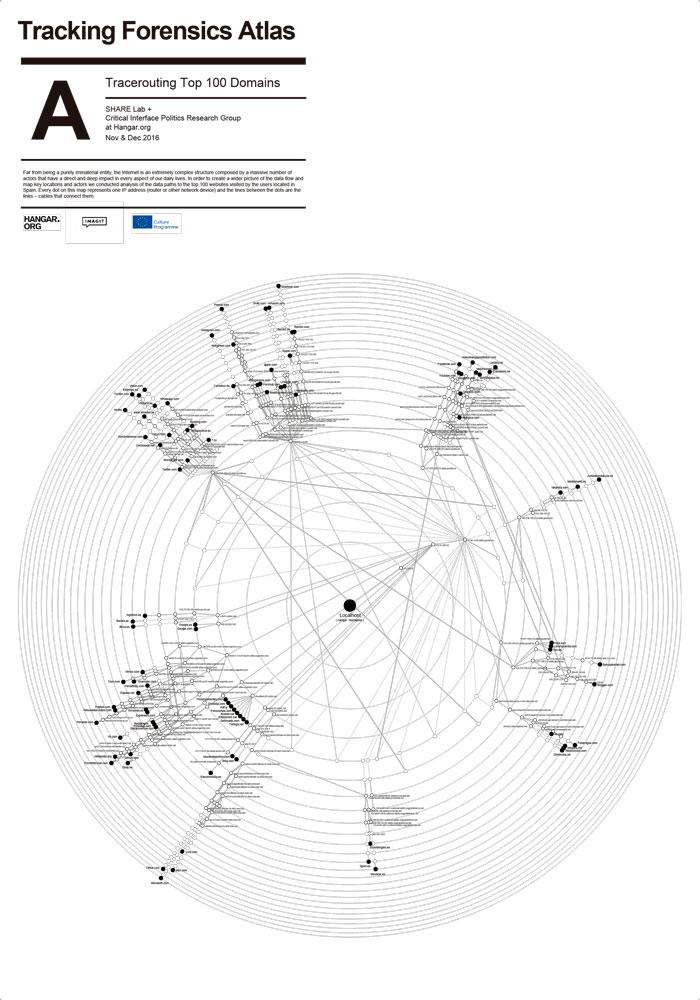
Tracking Forensics Atlas. Map #2 Tracerouting Top 100 domains
How did you proceed to uncover the physical paths of information? What kind of methodology and strategies did you use?
Archaeology! We made a big archive at Hangar with a group called Critical Interface Politics Research Group. If you have a look on the website, you will find tools, encryption, visualisation, research, activism, etc. But there’s still so much more information we should add.
During the workshops, we used various software but the most important thing lays in the tangible approach to these digital infrastructures and issues because the way you acknowledge things is totally different whether you just work with screens or you experience them physically. For example, we used maps to draw out a forensic analysis of the paths of information.
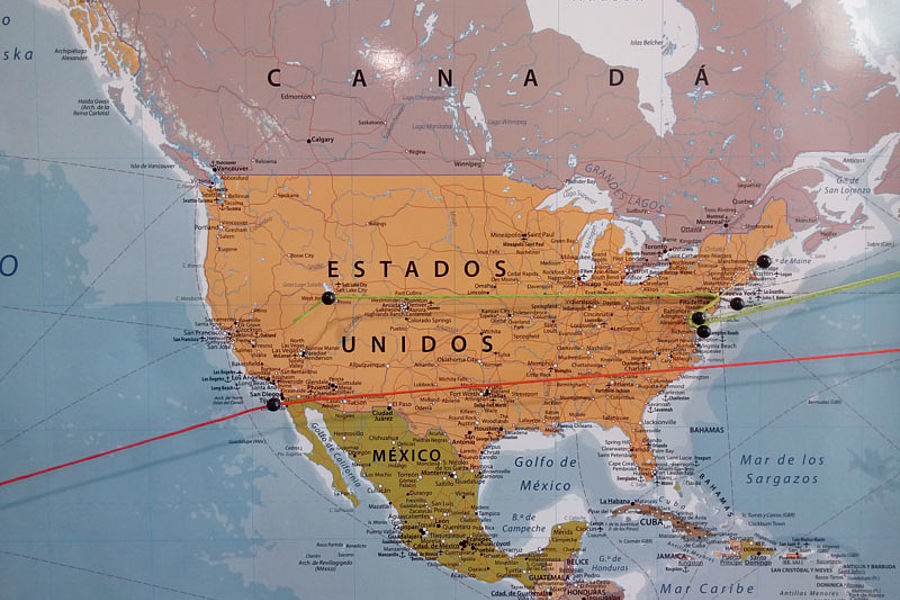
Poetic Destruction of the Interface, a workshop on Critical Interface Politics at HANGAR, Barcelona, 2016
As an individual who didn’t get the chance to participate to the workshop, how can i become better informed about the infrastructures hidden behind our dependency on the digital?
Together with the Share Lab, we are doing some Do It Yourself Tracking Forensics that we hope to publish soon. It’s basically what his residency at Hangar was about. It’s a project that Andrea and I proposed to do and Hangar is helping us develop it with group of Cyber Forensic people. This DIY is going to be for everyone because it has been very important for me right from the start to engage in critical pedagogic strategy. I want to not only help people with no technical skills understand all these things that are actually responsible for sculpting our reality but also i want this DIY to help them intervene autonomously in these systems.
Aren’t there other groups working on the same issues and putting resources out there just like what you’re trying to do? Or do you have to do all that research from scratch?
There are other people working on similar issues but because we do things in a different way, we still have to do all the research. For example, the Share Lab in Serbia is looking at similar issues but they only cover a part of it. Also Tactical Tech Collective, with whom I’ve collaborated on two projects, developed many pedagogical manuals on the issue. And then of course there is Julian Oliver and Danja Vasiliev but they don’t cover the physical part as in depth as we do, they are mostly looking at the architecture of information and that’s something that we, on the other hand, only cover very briefly. Our focus is on internet infrastructure and tracking. The pedagogy aspect is also very important for us. I also discovered a group in Austria that did a massive research in tracking. The output was a great paper that’s almost a book actually. There are other people in Amsterdam also but again, it’s different.
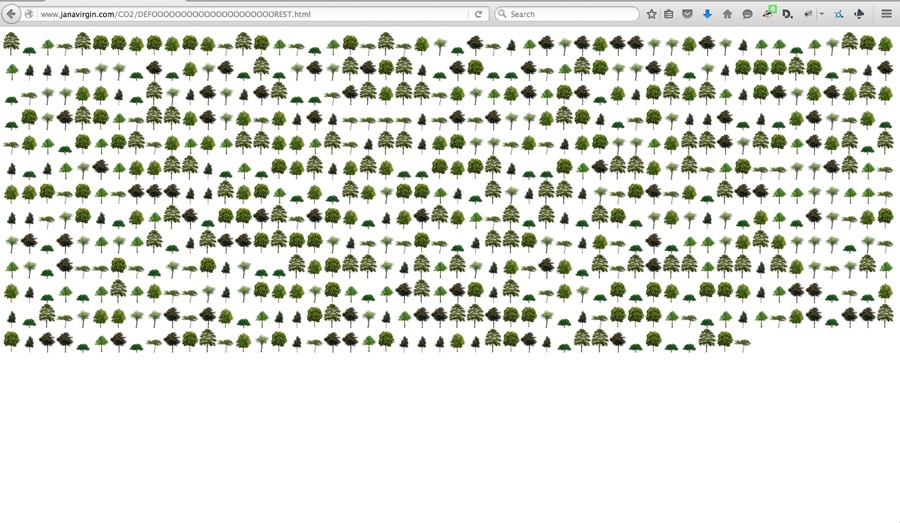
Joana Moll, DEFOOOOOOOOOOOOOOOOOOOOOREST
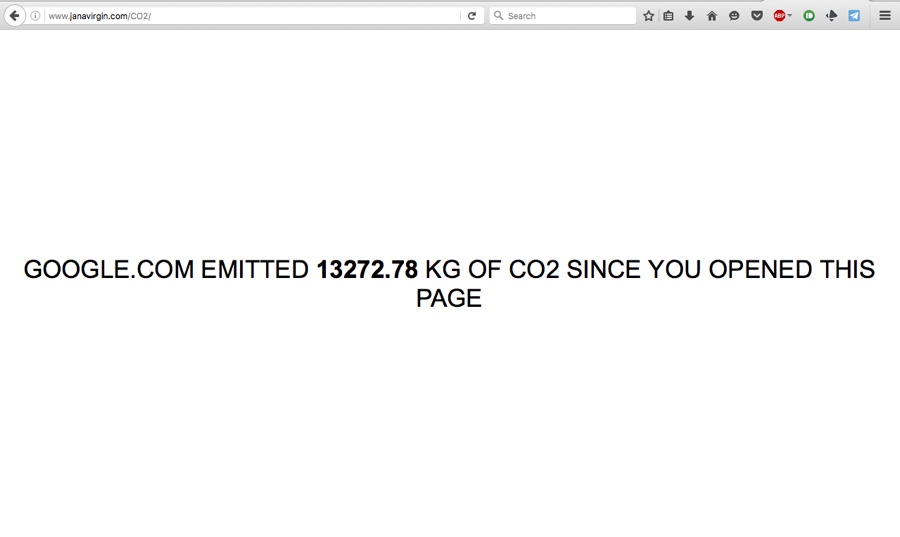
Joana Moll, DEFOOOOOOOOOOOOOOOOOOOOOREST
Your work DEFOOOOOOOOOOOOOOOOOOOOOREST explores the tangible and devastating impact of the most mundane habit: the use of google.com. The project visualises the amount of trees needed to absorb the amount of CO2 generated by the global visits to the search engine every second. The website is very simple yet so powerful that it makes me very anxious. I close DEFOOOOOOOOOOOOOOOOOOOOOREST almost as soon as i’ve opened it. It makes me feel helpless. Once we are more aware of the consequences of our daily internet gestures, is there anything we can do apart from despair?
It’s an ongoing debate. Because of course it’s easy to put all the weight on the shoulders of the end user and make them feel guilty for everything. However, i think it’s very important that we visualize the physical and ecological impact of our online actions. It needs to be embedded in the social imagination because it is quite unbelievable. Data generates C02, it pollutes. There are a few things we can do to help with the problem but they are very minimal. If you are a web designer, for example, you can try and put less images or just work in a more efficient way. Companies bear an even larger share of responsibility.
And in this case, policies have to be enforced from above. Change has to come from a political level and we need to take responsibility collectively if we want things to change dramatically.
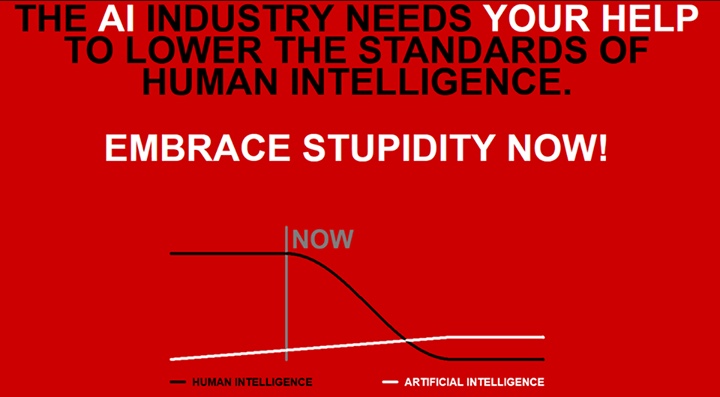
The Institute for the Advancement of Popular Automatisms, Embrace Stupidity
You are a co-founder of The Institute for the Advancement of Popular Automatisms. I read the about page, clicked around but i must confess that the more i thought i understood, the less i understood. So could you explain me in layman’s terms the activities of IAPA?
A lots of people tell me exactly that! They are not sure whether there are artists behind the project or if it’s just an algorithm doing all the work.
It’s actually very simple. I did this project together with Mexican artist Eugenio Tisselli. The Institute for the Advancement of Popular Automatisms is a platform that enables us to experiment in a very fast way with code, with language, with algorithms, to talk about poetry and the absurd and how machines communicate with humans. With this project we can do all that in a very unorthodox way, by using more the instinct and the irony. The projects that Eugenio and I do aside from this one are research-based and involve long processes. So IFAPA allows us to play a bit. It’s still serious but the approach is more laid-back, more simple. It allows us to play with our ideas and implement things that are important to our work. It’s kind of escape bubble too!
Any upcoming project, field of research or event you could share with us?
I’m working on another project that talks about how different agents that exploit data. I call that ‘data slavery’, there is a lot of dating sites that sell profiles to each other in a crazy way. You can by thousand or even one million profiles for a hundred dollars….
You mean real profiles?
Some of them are real, some are fake. But that doesn’t even matter because the pictures they use are pictures of real people.
I’m about to buy massive amounts of profiles and then try and understand where else these profile, these pictures, these names, or emails can be found. And from there, i want to explore the data of these slavery markets. In a previous research I did on the topic I’ve seen that one single profile was being exploited by more than 50 online services.
Together with Vladan we are writing a text that explores and exposes the ecological footprint of surveillance capitalism and we hope to release these before the summer.
Besides, and that’s very recent news, the next phase of the Critical Interface Politics Research Group will focus on deeply analizying the environmental impacts of internet infrastructures, data flows and interfaces through different interdisciplinary initatives. The plan is to gather a transdisicplinary resesarch team and design serveral interventions that will be able to both, expose the termendous material impact of communication technologies, create mechanisms and tools to reduce such footprint and make them available to the general public. We are in the process of writing the project and looking for partners right now.
Thanks Joana!
Joana Moll will be running a Tracking Forensics workshop at the Resonate Festival in Belgrade on 21 and 22 April. And if you can’t make it to Serbia, Joana will be giving online classes about the power of interfaces and the way we can learn to democratize them. The online program is organized by the School of Machines, Making & Make-Believe in May. I’ll also be giving online classes but on the topic of socially engaged creative practices, same month, only that Joana gets the Tuesdays and i get Mondays.)
And from April until July 2017, Joana will be teaching a course at Potsdam Universität in Germany on critical interface.
